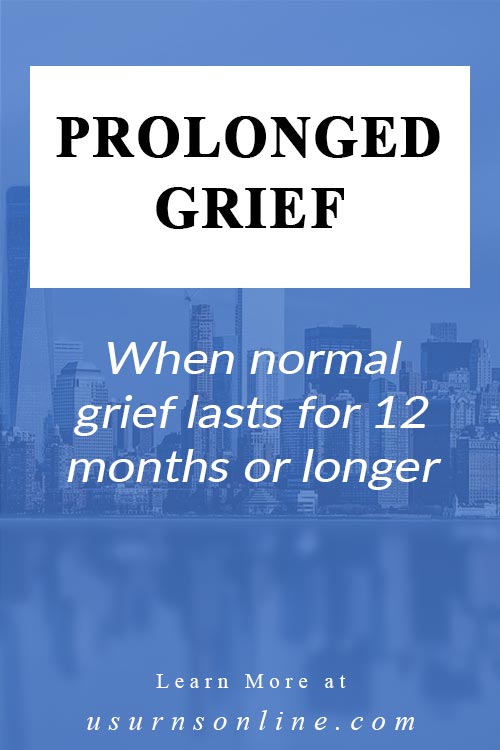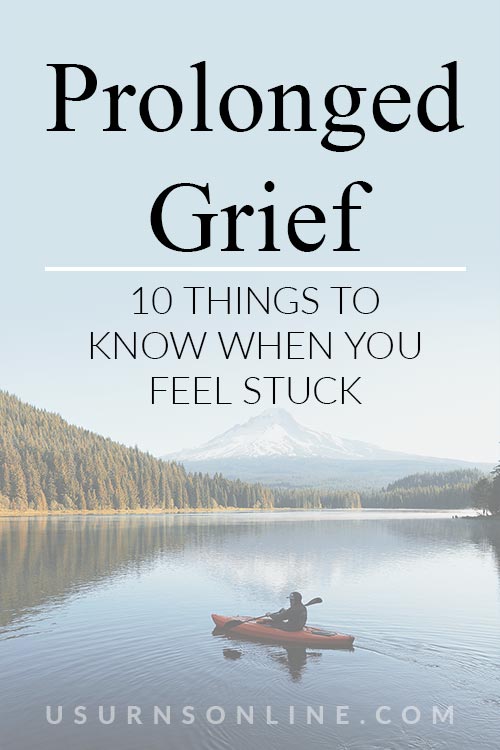Today we are going to address prolonged grief. Grief is one of the hardest journeys you will ever go on, and it is even harder when you feel trapped in an overwhelming sense of sadness for a very long time.
We will all walk the path of grief at least once in our lives. Whether you lose a loved one or a beloved pet, a job, a friendship, or whether going through a breakup or some other type of loss, grief is inevitable.
Have you ever felt stuck along the way? How do you get out of that “rut”? Can you recover from grief when it just seems hopeless?
I will be answering these questions and more. Continue to read and learn about prolonged grief and how to work through it.
What Is Prolonged Grief?
Prolonged grief is when you continuously experience crushing, overwhelming, debilitating sadness over something that occurred months or even years ago. You might feel like life just isn’t worth living. You may have felt as though you can’t let go of your loss. This can be typical when you’ve lost a close loved one – such as your spouse or a child.
Prolonged grief is also known as prolonged grief disorder. The World Health Organization describes prolonged grief disorder as persistent and pervasive longing for, or preoccupation with, the deceased that lasts at least six months after the loss.

What are the symptoms of prolonged grief?
- Difficulty accepting the loss
- No sense of purpose in life
- Over-reacting to minor issues
- Feeling irritable
- Having an unreasonable fear of loss
- Feeling fixated with your loss
- Intense yearning for the person
- Emotional numbness
- Bitterness or anger about the source of grief
- Identity confusion
- Inability to trust others
- The feeling of being trapped in grief
All these symptoms lead to impaired daily life, withdrawal from engagement, elevated risk of cancer and immunological issues, and reduced quality of life.
How is prolonged grief different from normal grief?
Prolonged grief is the most common type of complicated grief. Prolonged grief disorder refers to a syndrome or a group of symptoms. This syndrome consists of a distinct set of symptoms following the death of a loved one.
- Intense sorrow, pain, and thinking about the loss of your loved one
- Extreme focus on reminders of your loved one or avoidance of reminders
- You focus on little else but your loved one’s death
- Intense and persistent longing for the deceased
- Numbness or detachment
- Having problems accepting the death
Prolonged grief disorder is experienced by about 10 percent of grief sufferers.
Related: 10 Things You Need to Know About Normal Grief
How is prolonged grief different from chronic grief?
Chronic grief and prolonged grief are two different kinds of grief that last over a lengthy time period. Left without help or treatment, you may suffer from this emotional pain for the rest of your life.
Chronic grief will have you continually experiencing extreme distress over your loss with no progress towards feeling better. This form of grieving does not subside and will last over a long period of time.
Experts believe that this type of grief could be a result of codependency, as the mourner holds tightly to the memory of the loved one that has passed. Typically, anyone who grieves says they truly never get over it, but they learn to live differently. With chronic grief, the healthy, healing change does not occur.
While prolonged grief is similar to chronic grief, there are some subtle differences. Prolonged grief is marked by a general longing for the deceased that results in impaired functionality, engagement, and quality of life. It is most common among people who have lost a child or a romantic partner. It is more likely to occur after sudden or violent deaths; homicide, suicide, or an accident.
Related: 10 Things You Need to Know About Chronic Grief
10 Things to Know About Prolonged Grief
1. Prolonged Grief Disorder (PGD) is a real diagnosis.
PGD is defined by its symptoms, length, and severity. These are present every day, causing distress and functional impairment. These feelings remain strong, frequent, and crippling for more than six months after the death of your loved one.
2. PGD may soon be classified as a mental disorder.
The bereaved, whose lives have been disrupted for prolonged periods, may soon be officially diagnosed with a mental disorder that requires treatment.
Prolonged grief has been proposed for inclusion in the DSM (Diagnostic and Statistical Manual of Mental Disorders), which is the definitive assessment tool for the psychiatric profession.
3. Some people may be predisposed to experience Prolonged Grief Disorder.
This includes:
- Parents who have lost a child
- Someone that has lost a loved one through a sudden, violent death
- Occurs more often in females
- People that are suffering from other major life stressors such as divorce, financial hardships, or depression
4. Counseling can help your recovery from PGD.
Talking about your grief can help you to accept it. Through early counseling, you may learn healthy coping skills.
Read: Grief Counseling: Your Options for Help & Support
5. Grief is about loss, not just death.
When you’re going through your own undesired or unplanned episodes in life, you will feel pain. Whether it is divorce, loss of a job, or loss of a dream, you will feel grief. It’s good to remember that any loss you grieve is valid.
6. Time does not heal.
The adage “time heals all wounds” is a falsehood. Grief is a wound that is never totally healed. Time continues to go by – it is what you do with that time that matters most.
You must learn to cope and live differently. People do recover from grief and can continue to live very productive lives.
Read: How to Grieve Well
7. Grief will change you.
Your grief requires you to learn new ways of coping, new skills, and learning to live without that someone or something that meant so much. Life has already changed for you in a big way. Now it is up to you whether you can grow through that change.
8. Grief is a process that involves your emotions.
Helpful friends may try to give you “logical” reasons why you shouldn’t feel so sad. The problem with that is you have a broken heart and logical reasons will rarely help with that. Allow yourself to cry and grieve in your own way.
As Jesus himself said in Matthew 5:4, “Blessed are those who mourn, for they will be comforted.” Sadness is not always a bad thing. It is a natural human emotion, one of many that you will feel as you process the death of your loved one.
Related: 101 Beautiful Quotes About Letting Go
9. Grieving can make your brain feel “fuzzy.”
Grief can numb your brain. This is true for everyone, and especially so with prolonged grief.
You may find yourself in a daze or unable to focus. The fuzziness or fog of grief is emotional, mental, and physical. In most cases, your memory loss and inability to concentrate will fade away within a few months. There shouldn’t be permanent damage.
If you continue to feel “brain fog” for a long period of time, please seek counseling and help.
10. Recovery from PGD is possible.
Prolonged grief is a sense of loss that feels like it will never go away. That sense of inevitability, the feeling that there is no escape, is what prevents people from seeking help. Please don’t let that falsehood control you!
There are several things you can do to get through this. You can get professional treatment, meet with a grief support group, and practice stress management. Take care of yourself and stick with your treatment plan, and you will begin to see positive results.
More Resources to Help with Grief
This article is part of our series on The 16 Types of Grief. See that article for an overview of the different ways people grieve and link to further resources on each type. We also have a very helpful post on the common question, How long does grief last?
If you’re mourning the loss of a loved one, we invite you to explore this post on How to Grieve Well (or even poorly, for that matter).
If you are looking for ways to support a friend, we applaud you! Here are 22 tips on caring for someone who is grieving.


